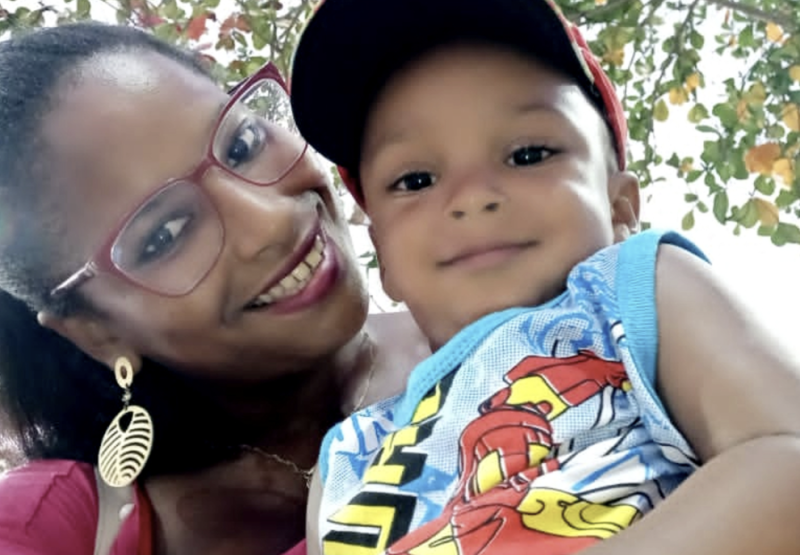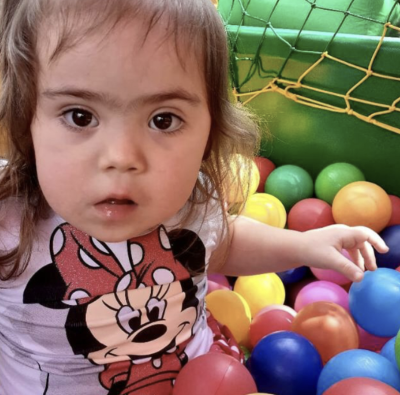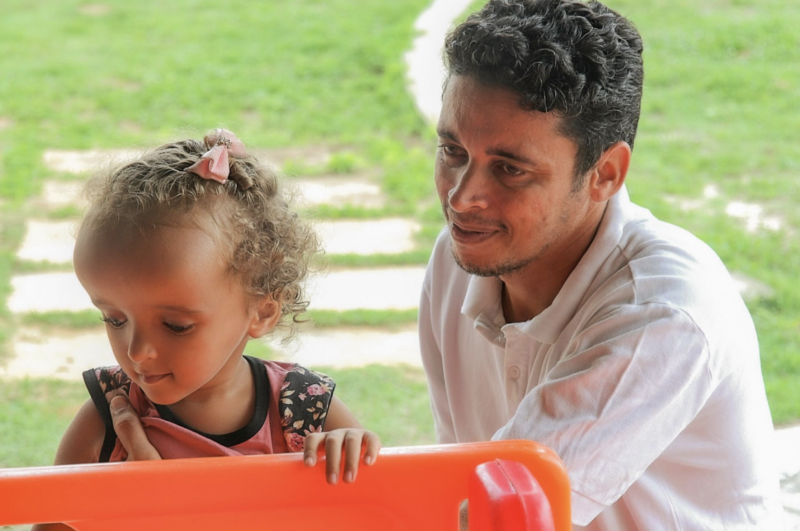

The street vendor Nereide Fernandes, 49, had her life strongly affected by the COVID-19 pandemic, as well as a significant portion of the Brazilian population. Living in São Paulo, Fernandes lost her job and faced difficulties to take care of her 2-year-old daughter Melissa, who has Down syndrome.
She and her husband, Araciaene Ferreira, 49, also a street vendor, struggled to get by, finding themselves unable to buy food or pay the rent. The extreme poverty situation combined with the stress of isolation and the fear of infection contributed to stir down spirits at home.
Conditions only eased in mid-2020, when the couple started receiving emergency aid from the government and the help of NGOs and neighbours. “I receive donations of food, toys. Nobody is so poor in Brazil that they can't help others,” says Fernandes in an interview with UNDP Brazil.
The difficulties of social isolation were also mitigated by the Happy Child Programme, a federal government initiative supported by the Joint SDG Fund aiming to boost early child development in vulnerable families through home visits. During the pandemic, such visits have taken place mainly remotely.
By phone or internet, trained professionals of the Programme recommend activities and games to stimulate children's cognitive development, motor coordination and communication. “I get two to three suggestions of activities a week, and I do them every day. When I have doubts, I send a message,” says Fernandes, who uses her neighbour’s internet connection.
Fernandes says the Programme helps to structure her daughter's routine during the pandemic, supporting her development even in a situation of social isolation and financial difficulties.
“Often, we have doubts about how to take care of Melissa because of Down's syndrome. But we learned from the Happy Child Programme that she is totally independent. Just a little patience is enough to explain and teach,” she points out.
“Those activities are very good because they make time fly, while we are taking care of the child. It is positive for us too, once it helps to lift the spirits,” says Fernandes, whose husband receives treatment for neurological disorder, which intensified during the pandemic.

Tainize Silva dos Santos, 21, works as a fisherwoman in the state of Bahia. Her son, Alessandro, age 1, is also a beneficiary of the Happy Child Programme. Santos has the support of the boy’s grandmother to reconcile the work of catching shellfish and taking care of the child.
In the pandemic, sales of the product fell sharply and, currently, Santos fishes only for the family's consumption. Inhabiting a two-room residence, she carries out the activities suggested by the Happy Child Programme every day.
“I only have the time at night because, during the day, I organize the house, I go fishing. But Alessandro is evolving well. The Programme helped a lot, the child feels encouraged. He became more perceptive, started to hold the pencil and now paints by himself.”
The kits distributed to beneficiaries include coloured pencils, papers, balls, paints, modeling clay, among other things. The initiative serves around 900,000 children in almost 3,000 Brazilian municipalities.
Research released in January in the scope of a UNDP project with the Bernard van Leer Foundation showed that, despite the difficulties generated by the pandemic, the Happy Child Programme continues to be well evaluated by the families. The study carried out 128 interviews last year with supervisors, visitors, caregivers, family members and local leaders from six Brazilian cities.

Among the main conclusions, the report indicated that there was an improvement in the communication between caregivers and children, intensification of family bonds and a greater perception of the importance of stimuli for child development. Among the challenges mentioned in the study were unavailability of time - mainly due to the work overload for mothers - the lack of space in the homes and the low engagement of men in the activities.
Since the beginning of the pandemic, the beneficiary families have had to make a series of adaptations to their routine, once the activities previously conducted by the visitors started to be carried out by mothers, fathers, and caregivers.
“We find a way to play inside our house, which is very small. We tie one chair to the other with a clothesline with colourful clothespins. Then we tell her to get one of each colour,” declares Fernandes. “We also use cardboard to cut and paint. We even have a task to do right now: to help Melissa identify a full and an empty box. Another activity serves to stimulate sensitivity, make her sense dry and wet, hot and cold,” she reports.
Even with the activities running smoothly, both Fernandes and Santos say they prefer face-to-face visits, as those intensify children’s interaction with people beyond their family members.
“Today, visitors hand me the kit in person, with physical distance. It is good that way, but the return of full in person visits would be better, because my son interacts more, talks more,” says Santos, aware that this will only be possible when it is safe.
“It is not easy, but we have to adapt. We know that our daughter needs this support, so we have to make some effort,” emphasizes Fernandes.
The street vendor fondly remembers a moment, before the pandemic, when the Programme visitor created a puppet show in her kitchen. “He put everything together with a cardboard box, brought the dolls and told Melissa many stories,” Fernandes recalls. "She was totally delighted!"
About the Joint SDG Fund in Brazil
The Joint SDG Fund is a United Nations programme that, in Brazil, seeks to strengthen public services aimed at early childhood by supporting the Happy Child Program.
The Programme's partner agencies in the country are the United Nations Children's Fund (UNICEF), the United Nations Development Program (UNDP), the United Nations Population Fund (UNFPA), the United Nations Educational, Scientific Organization and Culture (UNESCO) and UN Women.
For UN Brazil, integrated interventions in early childhood are crucial to improving the lives of families and communities. Investment in child development is one of the most efficient strategies for a country to eliminate extreme poverty, promote inclusive economic growth and expand equal opportunities.
In this sense, the Joint SDG Fund aims to increase the participation and retention of the municipalities eligible for the Happy Child Programme; expand the number of beneficiaries; strengthen the capacities of professionals and the quality of multisectoral interventions and support the Ministry of Citizenship in interventions and actions aimed at children and pregnant women.
This story was originally posted on the Joint SDG Fund